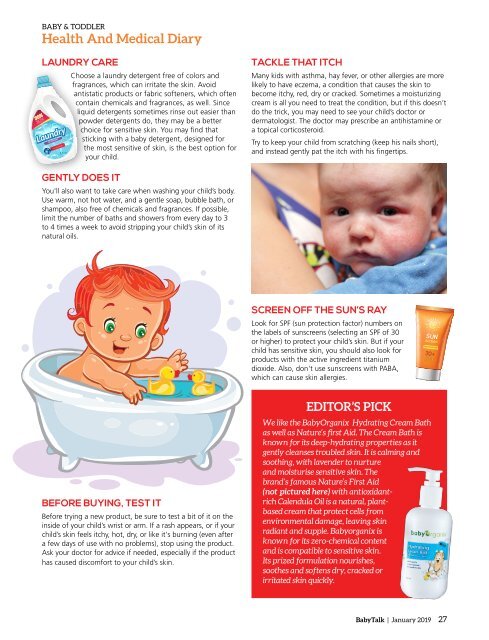Create successful ePaper yourself
Turn your PDF publications into a flip-book with our unique Google optimized e-Paper software.
<strong>Baby</strong> & Toddler<br />
Health And Medical Diary<br />
Laundry care<br />
MORE<br />
PRODUCT<br />
TRIPLE ACTION<br />
3.6 KG<br />
Choose a laundry detergent free of colors and<br />
fragrances, which can irritate the skin. Avoid<br />
antistatic products or fabric softeners, which often<br />
contain chemicals and fragrances, as well. Since<br />
liquid detergents sometimes rinse out easier than<br />
powder detergents do, they may be a better<br />
choice for sensitive skin. You may find that<br />
sticking with a baby detergent, designed for<br />
the most sensitive of skin, is the best option for<br />
your child.<br />
Tackle that itch<br />
Many kids with asthma, hay fever, or other allergies are more<br />
likely to have eczema, a condition that causes the skin to<br />
become itchy, red, dry or cracked. Sometimes a moisturizing<br />
cream is all you need to treat the condition, but if this doesn’t<br />
do the trick, you may need to see your child’s doctor or<br />
dermatologist. The doctor may prescribe an antihistamine or<br />
a topical corticosteroid.<br />
Try to keep your child from scratching (keep his nails short),<br />
and instead gently pat the itch with his fingertips.<br />
Gently does it<br />
You'll also want to take care when washing your child’s body.<br />
Use warm, not hot water, and a gentle soap, bubble bath, or<br />
shampoo, also free of chemicals and fragrances. If possible,<br />
limit the number of baths and showers from every day to 3<br />
to 4 times a week to avoid stripping your child’s skin of its<br />
natural oils.<br />
Screen off the sun’s ray<br />
Look for SPF (sun protection factor) numbers on<br />
the labels of sunscreens (selecting an SPF of 30<br />
or higher) to protect your child’s skin. But if your<br />
child has sensitive skin, you should also look for<br />
products with the active ingredient titanium<br />
dioxide. Also, don't use sunscreens with PABA,<br />
which can cause skin allergies.<br />
Editor’s pick<br />
Before buying, test it<br />
Before trying a new product, be sure to test a bit of it on the<br />
inside of your child’s wrist or arm. If a rash appears, or if your<br />
child’s skin feels itchy, hot, dry, or like it's burning (even after<br />
a few days of use with no problems), stop using the product.<br />
Ask your doctor for advice if needed, especially if the product<br />
has caused discomfort to your child’s skin.<br />
We like the <strong>Baby</strong>Organix Hydrating Cream Bath<br />
as well as Nature’s first Aid. The Cream Bath is<br />
known for its deep-hydrating properties as it<br />
gently cleanses troubled skin. It is calming and<br />
soothing, with lavender to nurture<br />
and moisturise sensitive skin. The<br />
brand’s famous Nature’s First Aid<br />
(not pictured here) with antioxidantrich<br />
Calendula Oil is a natural, plantbased<br />
cream that protect cells from<br />
environmental damage, leaving skin<br />
radiant and supple. <strong>Baby</strong>organix is<br />
known for its zero-chemical content<br />
and is compatible to sensitive skin.<br />
Its prized formulation nourishes,<br />
soothes and softens dry, cracked or<br />
irritated skin quickly.<br />
<strong>Baby</strong><strong>Talk</strong> | <strong>January</strong> <strong>2019</strong> 27

















